Journalism
‘Black On Campus’ Aims for National Impact

Black on Campus, a recently launched investigative journalism reporting program for black college students, has a strong presence at American University (AU).
AU School of Communication (SOC) professor, journalist and researcher Dr. Sherri Williams co-directs the project, and senior Lauren Lumpkin is one of the 10 students in the program. Williams' co-director is Dr. Melissa Harris-Perry, the Maya Angelou Presidential Chair and a professor at Wake Forest University. The program is run by the Anna Julia Cooper Center at Wake Forest University and The Nation magazine.

